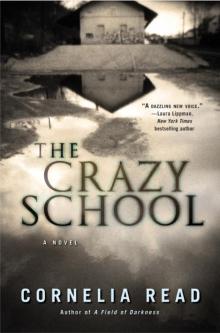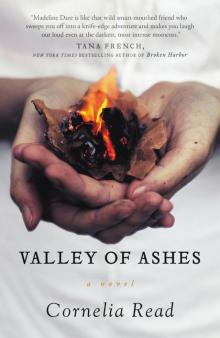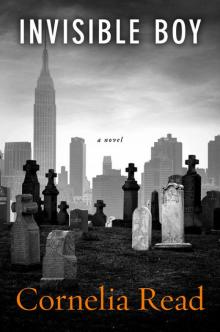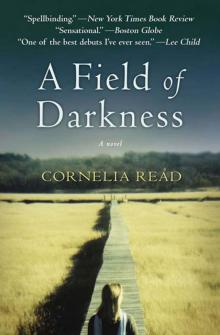- Home
- Cornelia Read
A Field of Darkness
A Field of Darkness Read online
Copyright © 2006 by Cornelia Read
All rights reserved.
Mysterious Press
Hachette Book Group
237 Park Avenue
New York, NY 10017
Visit our Web site at www.HachetteBookGroup.com.
The Mysterious Press name and logo are trademarks of Hachette Book Group, Inc.
First eBook Edition: May 2006
ISBN: 978-0-446-19793-9
For Grace and Lila, who are both sweetness and light.
Contents
Copyright
Part I: Syracuse, 1988
Chapter 1
Chapter 2
Chapter 3
Chapter 4
Chapter 5
Chapter 6
Chapter 7
Chapter 8
Chapter 9
Chapter 10
Chapter 11
Chapter 12
Chapter 13
Chapter 14
Chapter 15
Chapter 16
Chapter 17
Chapter 18
Chapter 19
Chapter 20
Chapter 21
Chapter 22
Part II: Centre Island
Chapter 23
Chapter 24
Chapter 25
Chapter 26
Chapter 27
Chapter 28
Chapter 29
Chapter 30
Part III: Syracuse
Chapter 31
Chapter 32
Chapter 33
Chapter 34
Chapter 35
Chapter 36
Chapter 37
Chapter 38
Chapter 39
Chapter 40
Chapter 41
Chapter 42
Chapter 43
Part IV: Centre Island
Chapter 44
Chapter 45
Chapter 46
Part V: Camp
Chapter 47
Chapter 48
Chapter 49
Chapter 50
Chapter 51
Part VI: Lake Oncas
Chapter 52
Acknowledgments
PART I
SYRACUSE, 1988
The Old Rich may all too easily describe a trajectory through life that, graceful and composed though it may be, is not in touch with the common ground of reality. Their bodies lack traction, their spirits lack consequence. Nothing they do makes any difference. Their noblest gestures, most beautiful arrangements of self and setting, greatest accomplishments, are all quite reasonably attributed to their unearned money. Deprived of the pain and pleasures of risk, they lose a large part of experience itself.
—NELSON ALDRICH, OLD MONEY
CHAPTER 1
There are people who can be happy anywhere. I am not one of them.
When the house on the next street went up in flames for the second night in a row, I wondered again what the hell I was doing in Syracuse.
Let me say right up front that those fires had nothing to do with the murdered sisters. They’d been dead nineteen years by then, their throats cut one state-fair night back in 1969 when I was three thousand miles away, about to start grade school in California.
Still, if I think of those girls, of everything that happened once I knew, it’s the image of that twice-burnt house I flash on first. Like maybe it was one long sly Dada-surrealist wink from the universe, a warning I should have been hip enough to catch.
The first night was already hot, so still the whine of a neighbor’s dog carried right through our bedroom window. I heard a screen door yaw wide to let him out, the tired spring slapping it closed behind, the click of canine toenails on sidewalk. I kept turning my pillow over and over, trying to find one cool spot on which to rest my cheek, but by the time that dog scratched to be let back in, I’d given up on sleep and rolled my grumpy ass right out of bed.
Wandering through our apartment, I wished for a breath of air from the second-story porch, just a shred of stray breeze meandering this far inland. No such luck. I ducked my head under the kitchen faucet and stretched out along the seven-foot legless purple Naugahyde sofa my husband Dean dragged home from a train car he’d rehabbed.
I hated this object, if only because the thing made my frail Waspy castoffs look even more ridiculous. The pair of Hepplewhite demi-lune tables. The painted Bavarian linen press. The stately between-wars globe amidst whose black oceans you could still find Ceylon and Formosa and the Polish Corridor.
I was twenty-five that summer, and everything I owned was scratched and warped, ring-marked by generations of abandoned cocktails. It was pure jetsam, the crap that gets thrown overboard on purpose. My money is so old there’s none left.
In that sense, Syracuse and I deserved each other. The place used to churn out everything from rifles to soda ash, helicopters to typewriters, but by the time I showed up they’d paved over the Erie Canal and gutted the great mills.
There were still traces of those glory days if you knew where to look, things like our radiator covers, made of the steel sheets from which Remington and Smith-Corona letter-key stems had been punched, leaving behind a delicate herringbone tracery. The ghosts of history are in the details, in the negative space.
I scrunched my pillow against the sofa arm and started reading a garage-sale paperback of In Cold Blood. Four pages on, I heard this long, dull fwhooomp from outside—noise so deep it echoed in my ribs.
There was a pillar of smoke framed all majestic in the porch doorway. It twisted black against the city-pink night sky, billows delineated by hundreds of thousands of red-gold sparks, pinpoint gems helixing up to join the stars. Exactly three a.m., if you believed the clock in the stove.
Soon there were fire trucks in the distance, their Doppler-effect wails punctuated with staccato chatter-and-yelp as they barreled through each intersection. When the engines rolled into the next street, they cut the sirens but kept all the lights going.
I stood up, dazzled by flashbulb pops of color from between the tight-packed old triple-deckers—strobing to pick out every dent in the alleyway garbage cans. I chucked the book and snaked on my flip-flops.
Outside, an ancient Oldsmobile muttered up the hill. It crossed the bright alley’s mouth, caught in momentary silhouette: exhaust blue with oil, wheel wells rusted to filigree. The fire sucked moisture from the air, tightening the skin along my cheeks.
I cut across the tar-soft street and between the woodframe hulks facing ours. For just a second, coming out the other side, it was like stepping into one of that guy Weegee’s photos from a forties copy of Life: black-and-white, some police-scanner tragedy back when everyone wore hats and cars were bulbous as the Hindenburg.
I blinked and it was just my neighbors milling slack-jawed, tank tops and stretch shorts bursting with that translucent flesh I always attribute to Kool smoke and government cheese. I stepped in among them and chastised myself: no worse snob than a poor relation.
Helmeted firemen, sweat-slicked in rubber coats, rushed to yank down equipment. They raised a ladder and we sighed, our eyes fixed on the rooftop flames, the heavy hose-arcs of water. We stood mesmerized until the trucks left, then stumbled home with that aftermath smell of bucket-doused campfire caught in our teeth. Insult to injury.
How absurd that it should all happen again the next night, the absentee owner maybe wanting to squeeze just that little bit more from his insurance. Three in the morning and there I was back out on the sofa, reading Capote and looking up in response to the onslaught of crackling noise.
For a minute I thought I should peel myself off the Naugahyde and shake Dean awake, but it was only an hour before his alarm would go off, even on a Sunday. For him that summer w
as all dawn-to-dusk welding and invention, at his family’s farm or with a railgrinder crew in Canada.
I should have gone to bed myself, but waited until after they’d put out the second fire. In the quiet that followed, there was the thump of a great storm sweeping in from the west. I knew the air would chill and sweeten in its wake.
A crack of street light spilled inward when I opened our bedroom door. Dean’s long legs were tangled in the top sheet, his summer-gilt hair bright against the pillow. I sat on the edge of the mattress and he stirred half-awake, pulling me in close when I stretched out beside him.
I’ll say again that the fires had nothing to do with the dead girls, but still those two nights are what kicked it all off for me. They were the last time I found sleep without first having to acknowledge, in the hollow dark, at least partial guilt for someone else’s murders.
CHAPTER 2
By the time I really woke up the next morning, Dean was long gone. I’d surfaced briefly as he kissed me goodbye, then listened for him to kick-start his Harley—its potato-potato idle all basso profundo in the predawn quiet.
Around eleven I shuffled into the kitchen. I’m an ideal candidate for a caffeine I.V., a liter bag of the stuff set to a fast drip and hung off a wheeled chrome dolly so I could drag it around. I settled for a pint glass of blistering-strong French Market coffee, cut by half with milk and finished with a fistful of sugar. Light sweet crude.
I sucked it back fast, already late for lunch at my in-laws’. Dean was home maybe a week, this time. I’d hammered him into promising he’d take the afternoon off.
His Canada gigs were brutal. Couple days’ notice from this local outfit Speer-O-Matic and he’d be off to moose country for weeks, the lone scab shoehorned into an otherwise-union crew car. No phones. Nothing but endless, blue-treed vastness and the mind-fracturing screech of grit tearing into steel.
If you’ve ever laid a penny on a track, you know how trains punish metal. They leave a shiny, paper-thin oval of copper, Lincoln’s face smeared clean out of existence.
Same thing with steel: trains mash microns of rail forward, like taffy in front of a rolling pin, leaving a series of regular waves behind. Each passing boxcar, hopper, and passenger coach exaggerates that pattern, until finally the track’s “corrugation” gets so pronounced that momentum along its distorted surface starts to batter equipment and burn extra fuel. At that point, you can either replace it or tackle the distorted bits. The second option is, not surprisingly, cheaper.
Enter the railgrinder, basically a locomotive fitted with twin rows of spinning, abrasive discs. Because track isn’t flat on top, the grinding crew had to angle these discs by hand, positioning each to shear a discrete ribbon of corrupted metal from the railhead’s convex surface. Even so, existing grinders couldn’t quite mimic the original half-teardrop profile.
Dean’s work meant we could never plan stuff. Not just because there was no telling how long he’d be home, but because he crammed pent-up months of invention into the downtime. On the road, he kept the old grinder up and running. At home, he was hell-bent on designing ways to automate it.
He’d programmed a computer to adjust each grinding head from inside the cab. Speer-O-Matic was ready to buy, but Dean thought a different linkage might replicate the railhead’s arc. If that worked, they’d get years’ more use from the same track, but the computer alone meant two guys, not twenty, could run any grinder in the world.
He could sell it to Speer-O-Matic, the Southern Pacific, anyone . . .
The union, of course, pretty much wanted him dead.
Dean didn’t care. He was too excited about how this was the “ideal opportunity to provide structural integrity for our future.”
I called it “a ticket out of this shithole.”
Spot the English major.
I looked at the stove clock again and hustled toward the bathroom sink, where I slammed a brush through my hair and some paste on my teeth.
If you want a visual for me, Madeline Dare, I’m five-five but lie and add an inch on my driver’s license. When I was fourteen, old guys in bars started telling me I look like Ingrid Bergman. In daylight among the sober, I’d pass for her hockey-playing cousin, the one who’s just a touch too fond of the creamed herring but still has the cheekbones and the narrow hips.
I confided this once to Dean. We were standing against each other, and since he’s exactly a foot taller than I am, the top of my head fits perfectly beneath his chin.
“Fuck Ingrid,” he said, insinuating an arm around my waist and peeking down the front of my sweater. “I vastly prefer a more buxom woman.” In that regard, he will never find this marriage a disappointment.
I grabbed the tabouleh I’d made the night before out of the icebox. Well, okay, “fridge” or whatever. I come from that tribe of verbal conservatives who still say “Victrola” and “toe-mah-toe”—Old High Long Island, my first language.
From the broom closet, I took my grandmother’s shotgun for a little after-lunch shooting. This was a beautiful object, a side-by-side 20-bore Holland & Holland Royal Brevis from the thirties, sent by my father two weeks after my twelfth birthday. It had been his mother’s, one of a pair, the barrels so true a fingernail flick still made them ping like crystal.
It was worth a great deal of money, and I should have sold it. Dean had accrued a tidy savings account from years of family agricultural labor, but other than the gun and my crappy furniture, I didn’t show up here with much in the way of dowry.
Dad had probably sent the gun less out of generosity than as one more way to expunge traces of our robber-baron ancestry. He meant well, but I think passing as a regular guy among the trailer-dwelling potheads of Malibu counted more with him than his daughters’ birthdays, most years. Still, I couldn’t bear to sell it.
I had long cherished the hope that if I gathered up and held on to all the stuff he’d abandoned—maybe while scrunching up my eyes and thinking only good thoughts—I could conjure him home. We’d get a do-over, him and me. Just keep hitting the rewind button until we landed back at the part where he walked out when I was four, then erase all the broken crap that happened after.
Not bloody likely.
Real life was him unfolding a director’s chair in the dirt outside his rusty VW camper every morning, ready to throw the I Ching with a fine Pacific view once he’d smoked his Wake-and-Bake joint.
Real life was me in Syracuse, broke and walking down to my rusty VW Rabbit with an appallingly expensive shotgun and a bowl of tabouleh, amazed again that I had come to rest here between Oyster Bay and California, the former poles of my existence.
Before I was fixed up with Dean by my friend Sophia, during a party at her parents’ place on Central Park West, I’d never set foot in this town. It is a testament to how much I adored my husband, despite what he called my “debutante sensibilities,” that I had stayed.
I cranked up NPR and leadfooted it out along 690 and 481, passing a dozen cars with 1988’s stupid suction-cup-pawed Garfield stuck to their rear windows. People were not yet so sick of them they’d begun slamming the heads in the trunk, letting the fuzzy cartoon corpses flop around in the slipstream.
It had been that kind of year—mostly froth. Sure, you had Benazir Bhutto and Solidarity. Summer Olympics in Seoul. Iran-Contra. But pretty much if you were American all you’d remember is shoulder pads and a lot of hair gel, a blur of photo-montage color.
Dukakis was still kind of in the running. I kept telling Dean that Ollie North was a flaming asshole, and he’d say the guy was just following orders. I’d retort that those had included upholding the Constitution, whether Reagan liked it or not, and that once Just Following Orders was considered a valid excuse for perfidy, it was all too easy to end up needing a rerun of the Nuremberg trials.
NPR agreed with me, which is what made Dean call it “The Voice of Managua.” Some commentator was still jawing on about Admiral Poindexter when I downshifted into the decreasing-radius turn at my inla
ws’ exit.
I soon pulled into their driveway, coasting past the cow-shaped “The Bauers” sign and up through the gravel until I was almost under the eaves of their wide blue house.
Dean was in the cool garage, rubbing crud off his hands with a scoopful of Gojo, the tin standing lidless beside his neatly folded coveralls. In green work pants and white undershirt, he could have been the central figure of some Soviet mural. All he needed was a wrench to brandish as he strode into the sunrise, red hightops glowing with promise.
“Hey there, sweaty young bronzed god,” I said, cocking a hip under the tabouleh.
“Bunny, my dear.” He smiled, wiping his hands on a shop rag, and leaned down to kiss me.
There was a constellation of tiny burns along his biceps, points at which welding sparks had singed through the coveralls.
We raced up the wooden steps to the kitchen, jostling each other through the door.
Dean called a breathless “Hey, pal” to his mother, Dot, throwing an arm across her shoulders.
“Oh, now, Deaner . . .” she protested, beaming.
She reached around him to pat my hand and give me a peck on the cheek. I asked if I could help with lunch and she took the tabouleh, saying “Now aren’t you sweet,” and “Doesn’t this look nice,” and assuring me that everything was taken care of. She shooed us both on inside so she could finish taping a four-color Sunday-paper portrait of Billy Graham to a cupboard door.
Dot was always so calm, so chatty with a little edge of laughter to every story, and yet got more work done in a day than any other ten people I know.
With me there’s always crap all over the place and it takes half an hour to find car keys or socks. Here everything was orderly, sparkling, and covered with cow pictures.
My mother-in-law has a serious weakness for Holsteins. From the “Happy Moo Year” kitchen calendar to the ironing board cover to the holder for spare rolls of toilet paper, everywhere you looked, there were pink-nosed, piebald, cud-happy faces. I don’t think she’d ever forgiven her husband Cal for switching from heifers to cash crops.
Cal and firstborn son Scott were sprawled out across the tweedy mustard plaids of the living room, watching a promotional video for a John Deere baler that would, the announcer promised, “virtually eliminate plunger-head slap.”

 The Crazy School
The Crazy School Valley of Ashes
Valley of Ashes Invisible Boy
Invisible Boy A Field of Darkness
A Field of Darkness